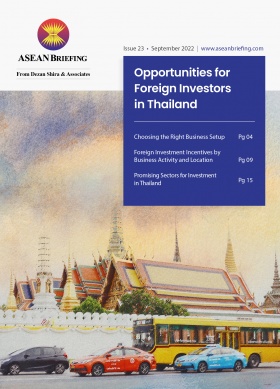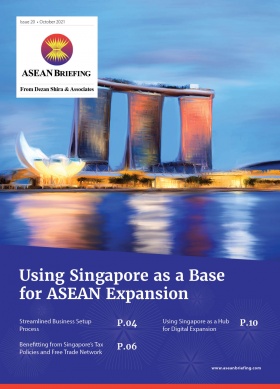Singapore Goods and Sales Tax Will Increase by 1% from January 2023
Singapore will increase its goods and sales tax (GST) as planned from January 1, 2023, from seven to eight percent. The hike is only the first of two planned increases in the GST rate as mentioned in the 2022 state budget. The second increase, also by one percentage point, will occur on January 1, 2024. GST-registered businesses must prepare adequately for the upcoming rate change, such as by updating their invoicing and accounting systems, as well as communicating clearly to customers how the GST increase will impact them.
Singapore will increase its GST from January 1, 2023, from seven percent to eight percent.
Despite increasing inflation, the government has stated that it will continue with the increase as planned.
The hike was mentioned in the country’s 2022 state budget announcement in which the government will increase the GST rate from the current seven percent to nine percent in two stages; by one percent each in January 2023 and January 2024.
Navigating the GST rate change as a consumer
Also, starting 2023, GST will also be applied on “low-value goods” bought from overseas; for example, items bought via e-commerce. At present, such low-value goods – items with a retail value less than $400 – are exempt from GST.
Goods bought from overseas during travel will also be subject to GST in 2023. For trips longer than 48 hours, travelers will get relief up to a $500 threshold and be taxed for the amount thereafter. For trips of a shorter duration, lesser than 48 hours, this GST relief is up to $100.
For items purchased or transactions and invoicing done before January 1, 2023, the GST charged will be 7 percent, even if the items are received after January 1, 2023 or brought into Singapore after January 1, 2023.
The Inland Revenue Authority of Singapore (IRAS) has provided a helpful list of scenarios to navigate the GST rate change as a consumer.
What is GST?
GST is a value-added tax levied on most supplies of goods and services as well as on imported goods.
Why is Singapore increasing GST? Increasing social spending
Social spending makes up the largest portion of the Singapore government’s annual expenditure, particularly for healthcare.
Between 2007 and 2019, government spending has rocketed from S$33 billion (US$23.3 billion) to S$75 billion (US$53 billion) per year. Further, healthcare spending in the same period rose from S$2.2 billion (US$1.5 billion) to S$11.3 billion (US$8 billion). If healthcare spending continues at its current rate, it is expected to amount to 3.5 percent of GDP – this is still lesser than social spending by European countries, which can reach up to 30 percent of GDP, though Singapore’s population is smaller.
The surge in social spending, and notably healthcare spending, is because Singapore’s population is rapidly aging. By some estimates, nearly one in four citizens is expected to be aged 65 and above by 2030. The government is thus expected to build more hospitals, and clinics, as well as offer medication subsidies to the elderly to reduce the burden of future healthcare costs.
How should GST-registered businesses prepare for the increase?
GST-registered businesses are advised to prepare as soon as possible for the upcoming rate change. Some areas that businesses should address include:
- Updating their accounting and invoicing systems to accommodate for the new GST rate;
- Updating any pricing schedules made available to customers and the public, such as on websites;
- Updating their cash register systems;
- Review contracts and agreements with suppliers or customers to accommodate the new rate;
- Equip employees with the relevant GST knowledge so that they are aware of its impact; and/or
- Seek the help of professional advisors who can assist in applying for any relevant GST schemes from the government.
The GST Assurance Package
The GST Assurance Package was announced in late 2019 under the 2020 state budget with the aim to help low and middle-income earners cushion the impact of a planned GST hike. However, due to COVID-19, the increase was suspended before being introduced again for 2023 and 2024.
Under this S$6 billion (US$4.2 billion) package, all adult Singaporeans are to receive between S$700 (US$495) and S$1,600 (US$1,132) – depending on their income – in cash payments disbursed over five years from 2022 to 2026. The first payout will be made in December 2022.
The government has since boosted the package by S$640 million (US$453 million).
Also, Read
- A Case for Expanding to Batam: How Singapore-Based Companies Can Benefit
- Remotely Establishing Entities in Asia: China’s Mainland vs. Hong Kong vs. Singapore
- The RCEP Advantage: Part 2 – Opportunities in Singapore
About Us
ASEAN Briefing is produced by Dezan Shira & Associates. The firm assists foreign investors throughout Asia and maintains offices throughout ASEAN, including in Singapore, Hanoi, Ho Chi Minh City, and Da Nang in Vietnam, Munich, and Esen in Germany, Boston, and Salt Lake City in the United States, Milan, Conegliano, and Udine in Italy, in addition to Jakarta, and Batam in Indonesia. We also have partner firms in Malaysia, Bangladesh, the Philippines, and Thailand as well as our practices in China and India. Please contact us at asia@dezshira.com or visit our website at www.dezshira.com.
- Previous Article Philippines to Establish Sovereign Wealth Fund
- Next Article Aeroflot to launch flights to Bangkok From Irkutsk in January








